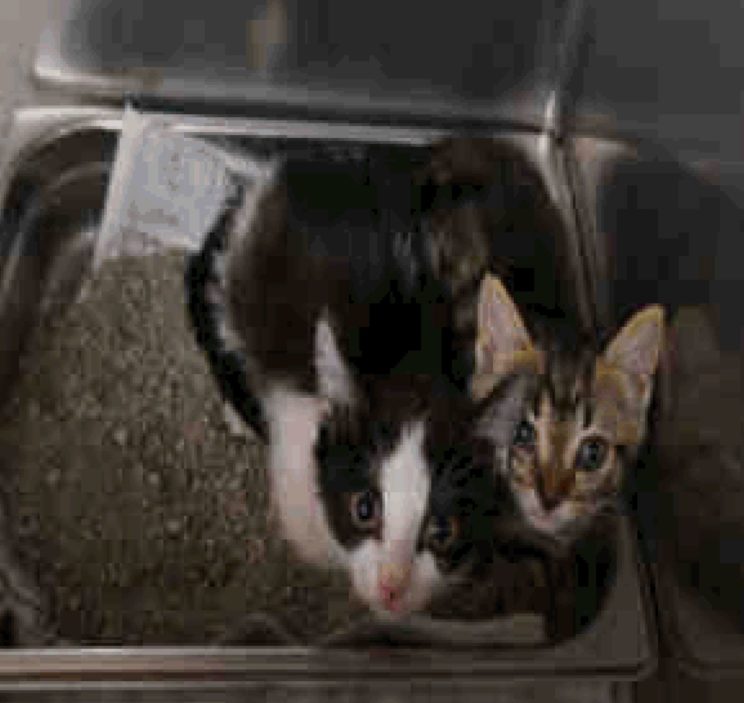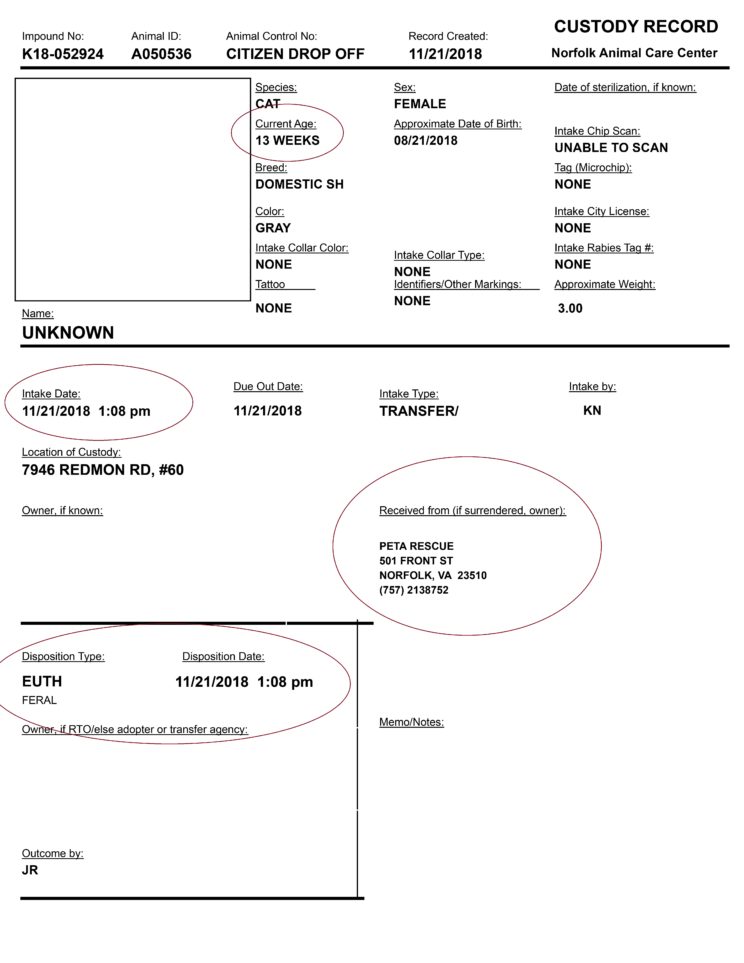
Among the dead are the young and healthy kittens pictured above.
Donations to PETA are being used to round-up healthy kittens to be killed. Norfolk, VA, taxpayers subsidize the effort, paying for the barbiturates used to poison them through a fatal overdose.
According to records obtained under the Public Records Act, the vast majority of kittens rounded up by PETA employees in 2018 and delivered to the Norfolk, VA, pound — nearly seven out of 10 killed — were killed in less than 60 seconds of being impounded, with no effort to foster them or find them homes. In fact, they were killed so quickly, staff did not bother to take photographs.

Among the dead are the young and healthy kittens pictured above. Photos for them exist because staff waited 24 hours before killing them, which is 24 hours more than most were given. Others killed include eight week old kittens, 11 week old kittens, 13 week old kittens, six month old kittens, seven month old kittens, eight month old kittens, and 1 year old juveniles. Some of the cats killed were pregnant, resulting in the deaths of the kittens in utero from anoxia (oxygen deprivation) once the mothers were killed. They suffocated. Since none of these kittens were counted in statistics, the death toll is even higher.
All but four were healthy. The vast majority were 1 year old or younger, with their whole lives ahead of them. The oldest was only five years old. PETA listed them all, and reported them all to the state, as transferred (and thus “live releases”) knowing they were killed. In other words, in addition to rounding up to kill healthy animals, PETA also misleads the public about the extent of the killing they participate in.
Why?

Operating on the belief that life is suffering, animals want to die, and that killing them is — according to PETA founder Ingrid Newkirk — the “gift of euthanasia,” the PETA employees who work in PETA’s Community Animal Project have, according to former employees, one overriding goal: to acquire as many animals as possible in order to put them immediately to death. And they are told to lie and even steal people’s companion animals in order to do so. (You can learn more about PETA’s killing and the perverse philosophy behind it by reading my book, Why PETA Kills, available free for download today and tomorrow on Amazon by clicking here.)
Former PETA fieldworker Laura Lee Cascada’s experience rounding up to kill animals is recounted in the above video.
Earlier this year, Laura Lee Cascada, one of those employees, described an archetypal scenario,
I responded to a call from a concerned woman who’d found an abandoned days-old kitten under her porch. When I came to pick up the kitten, I had her sign a generic give-up form that spelled out that euthanasia was a possibility. But I was instructed to repeatedly convey that we would do our absolute best, and so that’s what I said, even as the woman described her careful search for an organization she knew would work around the clock to help this tiny being pull through. It was my job to make sure I did not leave without that cat-Š—-Šthat I said whatever necessary for the woman not to change her mind.
The entire way back to PETA’s Norfolk, Virginia, headquarters, I sobbed, petting the infant cat in my lap, telling her things would all be OK, even though in my gut I knew it wouldn’t, that she never really had a chance. I even began plotting out how I might take a detour and deliver her to a rehabber instead. But how could I explain a missing kitten to the woman waiting with the needle? I couldn’t, so I complied without a word.
Heather Harper-Troje, another employee, stated,
I know from first hand experience that the PETA leadership has no problem lying. I was told regularly to not enter animals into the log, or to euthanize off site in order to prevent animals from even entering the building. I was told regularly to greatly overestimate the weight of animals whose euthanasia we recorded in order to account for what would have otherwise been missing ‘blue juice’ (the chemical used to euthanize), because that allowed us to euthanize animals off the books. I was told regularly to say whatever I had to say in order to get people to surrender animals to me, lying was not only acceptable, it was encouraged:
According to Harper-Troje,
This included telling people that PETA would find a good home for their dog and cat when we knew that PETA had no intention of trying to find the animals homes but would instead euthanize them almost immediately.
She also notes that,
If we saw animals loose, even on someone’s property, we were to take them whenever we could. PETA would not hold them for five days [as the law required]. We would not obtain signed releases if an animal was stolen, but would euthanize the animals immediately.
We would routinely euthanize healthy puppies and kittens and other highly adoptable animals.
“Contrary to what PETA maintains,” she says, “the majority of animals it takes in are not beyond hope, in my experience many would be considered highly adoptable by a shelter, the ‘better off dead’ line is one that is dragged out in order to excuse what they do — and it’s a lie.”
Former PETA fieldworker Heather Harper-Troje’s experience rounding up to kill animals is recounted in the above podcast.
PETA employees who have been caught in the act have been arrested in North Carolina and Virginia. Although none have been convicted, they have been successfully sued. PETA paid a family $49,000 after surveillance video showed them entering private property to take a family’s dog; a dog PETA admitted that they illegally killed the same day in violation of the state-mandated holding period.
PETA’s Failed Attempt to Silence Whistleblowers
In addition to stealing animals, lying to acquire animals, and falsifying records to kill animals “off book,” PETA has attempted to silence people from making the information public. This includes misusing the courts by filing meritless lawsuits in a bid to intimidate critics. The Reporters Committee for Freedom of the Press, the organization founded by legendary Washington Post editor Ben Bradlee of Watergate and Pentagon Papers fame, issued a statement saying PETA’s efforts undermine the First Amendment and “should be alarming for all newsgatherers.” In that case, PETA vs. Winograd, they lost, a victory for the animals.
My experience winning a case against PETA’s meritless attempt to intimidate me (and others) into silence is recounted in the above video.
A copy of PETA’s reported statistics to the state of Virginia, where they listed the above cats who were killed as “transferred” and thus live releases, is available here.
More information — including documents, photographs, government inspection reports, court cases, and whistleblower statements — is available by clicking here.
Why PETA Kills, my book, is available on Amazon by clicking here. The e-book version is free to download today and tomorrow.*
* You don’t need a Kindle or Kindle Unlimited to read Why PETA Kills (click below Kindle Unlimited where it says “$0.00 to buy”); but you do have to first download the free Kindle reading app from Amazon, the Google Play store, or iTunes, which you can use on any PC, smartphone, or e-reader.
————-
Have a comment? Join the discussion by clicking here.